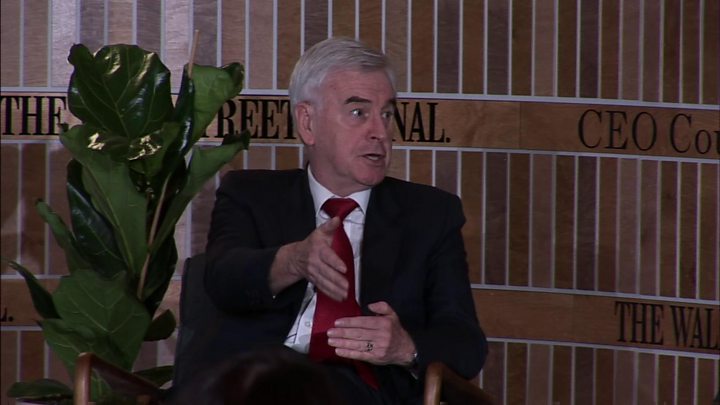Brexit: 'No significant shift' by ministers in talks, says McDonnell

There has been no "significant shift" by the government in cross-party Brexit talks, John McDonnell has said.
The shadow chancellor said Labour had not seen enough movement from ministers, especially on the issue of a customs union with the EU, adding: "We're not near what we want."
Cabinet discussed the state of the talks earlier, which have been going on for weeks with little sign of progress.
Mr McDonnell insisted Labour had "compromised in some areas".
He also criticised a letter from 13 former Tory cabinet ministers and Sir Graham Brady, chairman of the backbench 1922 Committee, to Theresa May, urging her not to agree a deal with Labour that includes a customs union.
Speaking at a Wall Street Journal event in London, he said "the customs union element is absolutely key to us", but the letter gave the party "no security" that any deal done would be honoured in the long-term - especially once Mrs May is replaced as Tory leader.
"We've gone into this in really good faith, we've tried to put party politics to one side…" Mr McDonnell said.
"Our big problem now is if we're going to march our troops in Parliament to the top of the hill to vote for a deal and then that's overturned, literally, in weeks, I think that would be a cataclysmic act of bad faith."
'Imperative'
Attempts to find a cross-party compromise began after Theresa May's Brexit deal was rejected three times by MPs.
The inability to agree on a way forward led the UK to miss its 29 March deadline for leaving the EU - the current date for departure is 31 October.
Following Tuesday's cabinet meeting, BBC political correspondent Nick Eardley said ministers had agreed that talks with Labour would continue.
So far both sides have resisted calls to set a deadline on the negotiations.
But the prime minister's official spokesman said the government believed it was "imperative" that the Withdrawal Agreement Bill - the legislation required to leave the EU - was brought to Parliament in time for it pass all its stages by the summer recess.
No date has so far been set for the summer recess, but Parliament usually rises towards the end of July.
Robbins in Brussels
The cabinet discussions came as the PM's Brexit negotiator Olly Robbins travelled to Brussels to explore the scope for changes to the political declaration between the UK and the EU.
The document sets out the parameters for the future relationship, and Labour negotiators have insisted that any deal they strike with ministers must be reflected in changes to it.
Labour wants to agree a permanent and comprehensive customs union with the EU after Brexit, with close alignment to the single market.
Inside a customs union there would be no internal tariffs (taxes) on goods sold between the UK and remaining EU countries.
But it would mean the UK cannot negotiate its own trade deals on goods with other countries around the world, something many Brexit-supporting Tory MPs support.
A Downing Street source told BBC political editor Laura Kuenssberg that a compromise was being sought with Labour on customs "as an interim position or a stepping stone".
"We will not sign up to a permanent customs union," the source said.
'Remainer at heart'
Mr McDonnell also said during talks, Labour had told ministers they "may well have to concede that there is a public vote of some sort" to get a deal through Parliament.
"We need to test the numbers on that. And at the moment there has not been much of a shift", he said.
At the weekend, shadow Brexit secretary Sir Keir Starmer said a "significant number, probably 120 if not 150" of Labour MPs would not back deal without a "confirmatory vote".
On the prospect of another referendum, Mr McDonnell said: "My view is that you'd put the deal to the people, but you'd have to also have the option of the status quo."
"Deep in my heart, I'm still a Remainer, but I've got to try and bring together effectively what is a British compromise."
Asked if Labour leader Jeremy Corbyn was also a Remainer in his heart, the shadow chancellor responded: "Yes."
He added that Mr Corbyn had faced criticism about his role in the 2016 referendum campaign but he knows "how hard he worked" before the vote.